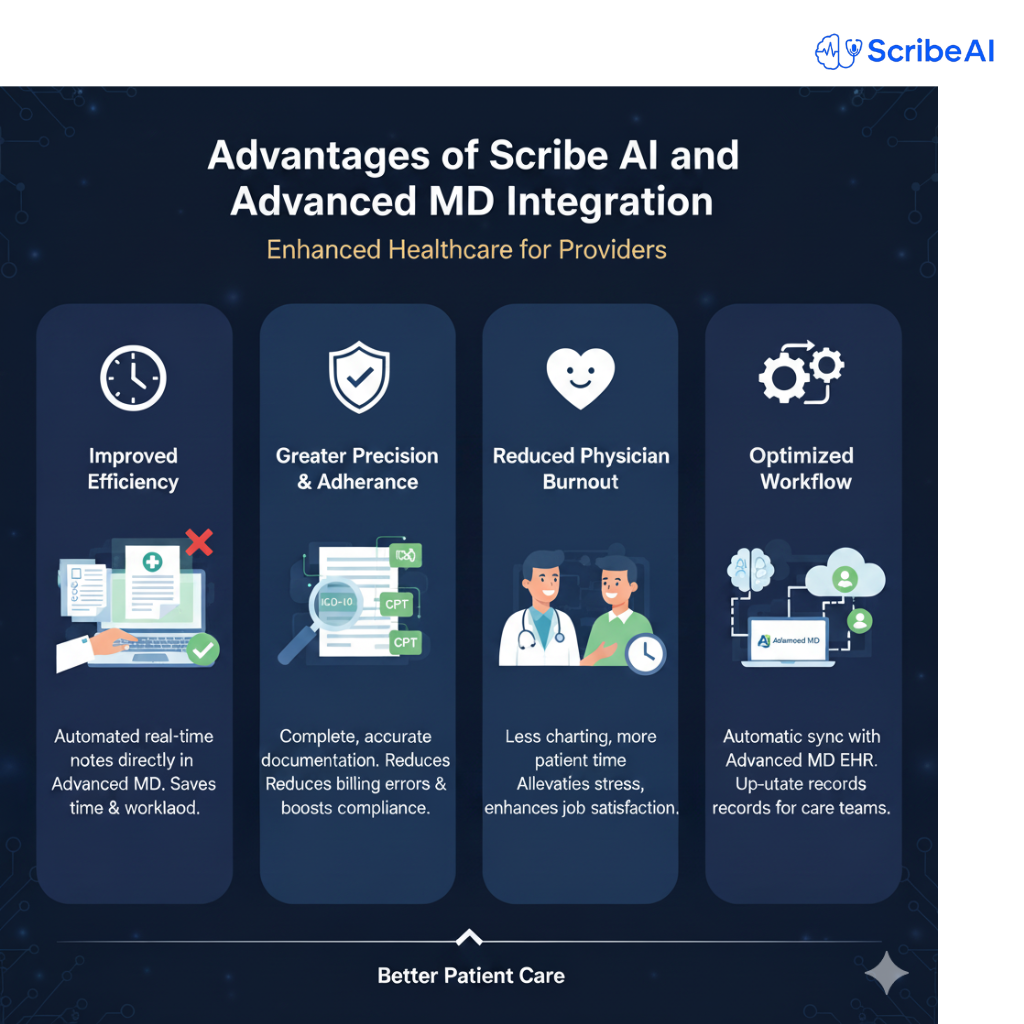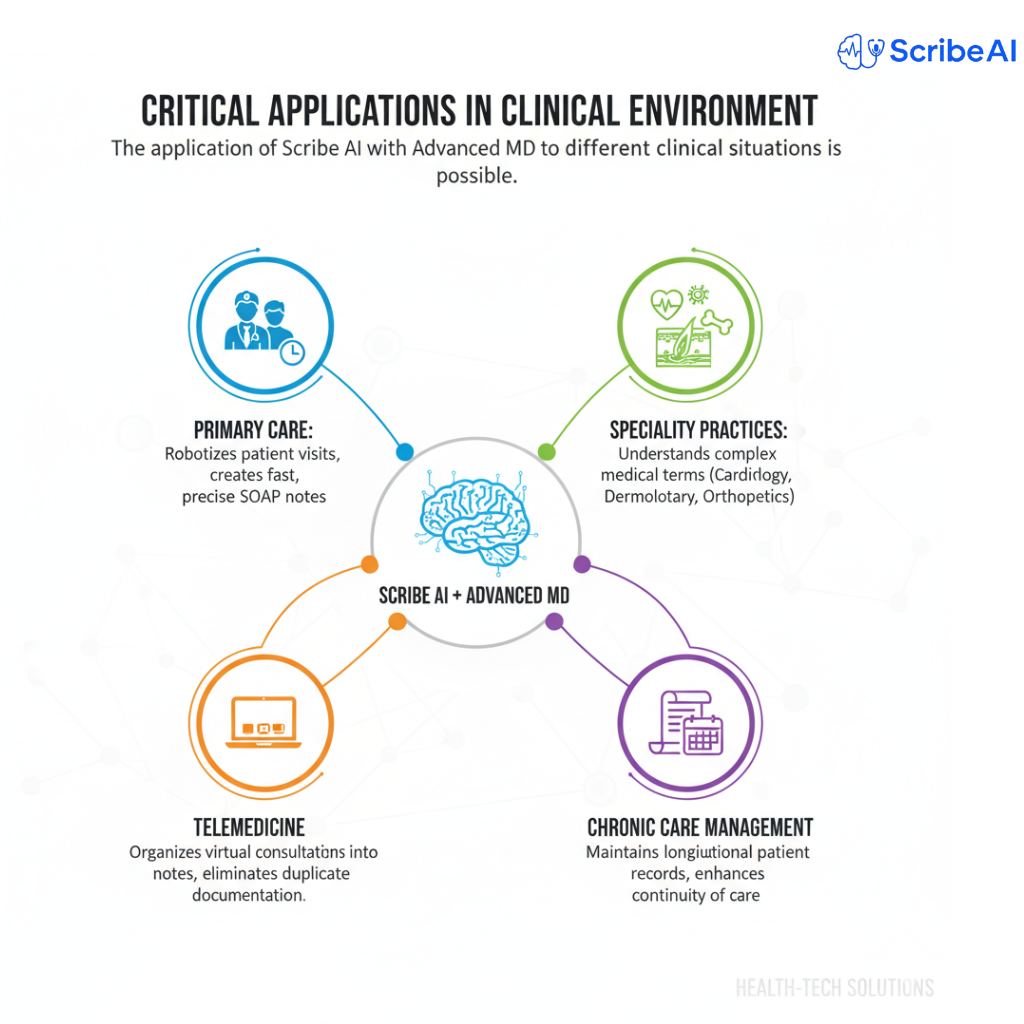Understanding Scribe AI and Advanced MD HER
Scribe AI is a highly developed artificial intelligence system that will automate medical records. It uses natural language processing (NLP) and machine learning to transform conversations between the physician and the patient into precise, structured clinical notes. This way, it will save the clinicians time they can use in the work with the patients instead of spending time charting.
Advanced MD EHR is an inclusive electronic health record (EHR) system that has become very popular among health care providers in the United States. It provides scheduling, billing, telemedicine and powerful clinical documentation. With the help of Scribe AI and Advanced MD, medical professionals can experience a flawless workflow in which AI-assisted documentation will be a part of the rich functionality of a platform.
Advantages of the Scribe AI and Advanced MD Integration
There are several advantages of the Scribe AI-Advanced MD EHR integration to healthcare providers:
- Improved Records Efficiency - It may consume half a day of work of a physician to do manual documentation. In Scribe AI, the notes are created automatically in real time, and they are created directly inside the Advanced MD interface. This saves time and workload in the administration.
- Greater Precision and Adherence - Scribe AI makes sure that the documentation is complete and meets the medical coding requirements. This reduces errors that may impact billing, compliance, or care to the patient.
- Reduced Physician Burnout - With the help of automated repetitive charting, clinicians will be able to spend more time with patients, which will alleviate stress and enhance job satisfaction.
- Streamlined Workflow - The integration enables automatic synchronization of the notes that are generated by AI to Advanced MD so that all care team members can have an up-to-date record.

The Way Scribe AI Functions in Advanced MD
The integration process should be easy to use. After Scribe AI is integrated with AdvancedMD, the system receives voice or typed input documentation of clinicians and converts it into standard clinical notes. Key features include:
- Voice Recognition: Clinicians are able to voice record patient interactions, and Scribe AI turns them into formatted notes in real-time.
- Contextual Understanding: The AI will identify medical terms, patient history and clinical background to produce the right documentation.
- Custom Templates: Scribe AI can use Advanced MD templates, which are sure that the notes are documented according to the practice-specific documentation standards.
- Immediate Updates: Scribe AI-created notes will automatically be added to the Advanced MD chart of the patient, and they will be immediately reached by the other members of the staff.
Not only does this save time, but also makes sure that all notes are of standard in terms of documentation and coding requirements by the regulatory bodies.
Procedures to Implement Scribe AI and Advanced MD
The implementation of Scribe AI into Advanced MD has a number of steps that are relatively simple:
- Assessment and Planning - Analyze the workflow of your practice and determine where the documentation issues are. Identify the features in AdvancedMD and Scribe AI that will be of the most value.
- Software Setup - Install Scribe AI app or a plug-in that is compatible with AdvancedMD. Make sure that the required API or interface settings are achieved.
- Template Customization - Make clinical templates suit your practice. Scribe AI has the ability to study these templates to write similar notes across disciplines.
- Training and Onboarding -Train clinicians and staff on voice command usage, review of AI-made notes, and correction (where applicable).
- Go Live and Monitor - After integration, observing the performance of the system, obtaining feedback, and optimizing the working processes should be done.
Critical Applications in Clinical Environment
The application of Scribe AI with Advanced MD to different clinical situations is possible:
- Primary Care: Robotizes patient visits, which is creating SOAP notes as fast and precise as possible.
- Specialty Practices: Does not have any issues with complex medical terms with regards to cardiology, dermatology, or orthopedics.
- Telemedicine: Turns virtual consultations into properly organized notes, so that there is no necessity to write down twice.
- Chronic Care Management: Maintains longitudinal patient records of patients with chronic illness, enhancing continuity of care.

These applications show that AI-based documentation can become very efficient and accurate in various healthcare environments.
Maximizing Physician Productivity
The productivity of physicians can be observed by providing Scribe AI with the task of documentation in Advanced MD. Research shows that clinicians are able to spend a number of hours per week saving time, which could be channelled to patient interaction, telehealth appointments, or even self- care.
Scribe AI also lessens cognitive load on physicians by decreasing the manual charting. This enables providers to concentrate on decision-making and communication with the patients that are complex and eventually improves the quality of care in general.
Control of Data and Compliance
The data of healthcare is very sensitive, and it is essential to adhere to such laws as HIPAA. All the documentation is inspected by Scribe AI to have a high level of privacy. Some of its security features are:
- Encrypted Data Transfer: This is to be provided to guarantee that patient data stays safe at the time of integrating Scribe AI and Advanced MD.
- Access Controls: AI generated notes are accessible by authorized staff only.
- Audit Trails: Records the modifications to documentation in order to comply.
Difficulties and The Problems on How to Overcome :
Although Scribe AI integration is of great use, the practices can face some challenges:
- Learning Curve: It might take staff time to become accustomed to AI-assisted documentation.
Remedy: Provide systematic training and give constant support.
- Individualization Requirement: There are practices that will need customized templates.
Solution: Scribe AI will permit template flexibility depending on specialties.
- Initial Set-up: IT support can be needed to facilitate the technical integration. Solution: Collaborate with the technical teams of AdvancedMD and Scribe AI, in implementation. Considering the solutions to those challenges, healthcare providers will be capable of a successful integration and get the most of AI-powered documentation.
Future of AI in EHR Systems
The use of Scribe AI in collaboration with Advanced MD is not the only part of the potential of AI in healthcare documentation. Future developments will contain:
- Patient care prediction analytics.
- Clinical discrepancies alerts in real time.
- Code and billing suggestions are automated.
- Better integration of various EHR systems.
.png)
With the further development of AI, an option such as Scribe AI will become a regular part of EHRs, with outstanding efficiency, accuracy, and insights.
The merging of Scribe AI and Advanced MD EHR is the paradigm shift in the modernization of healthcare records. Scribe AI allows healthcare providers to prioritize patient care by automating routine charting to improve accuracy and physician burnout, thus saving time to concentrate on what is important. AI along with a powerful EHR system such as the Advanced MD guarantees a smooth, secure, and very effective workflow, which will place practices at the forefront of the long-term success in the health care system that will become more digitalized soon.
Get prepared to change your practice using AI-based documentation?
Combine Scribe AI and Advanced MD today and enjoy improved, quicker, and more precise charting, less responsibility on the administrative side, and better patient care.
To learn how your practice can go smarter and use automated documentation, contact Scribe AI to book a demo.
Frequently Asked Questions
Q1: Does Scribe AI support multi-specialty Advanced MD?
Yes, Scribe AI can produce the correct documentation of various medical fields, such as primary care, cardiology, dermatology, and others.
Q2: Does Scribe AI make patient data safe?
Absolutely. The privacy and security of patient data are provided, and all data is encrypted and stored according to the HIPAA standards.
Q3: Do the doctors require training on the use of Scribe AI?
It does not need a lot of training. Scribe AI is very intuitive; however, the onboarding session is encouraged to achieve the highest level of efficiency.
Q4: What is the time required to combine Scribe AI with Advanced MD?
The amount of time required to integrate depends on the size of the practice, although it is possible to set up in a matter of a few weeks with the right planning.
Q5: Does Scribe AI minimize billing errors?
Yes, Scribe AI is beneficial in creating full and accurate records, which can be used to make sure that the coding and billing process are accurate, which means that it will not lead to claim rejection.